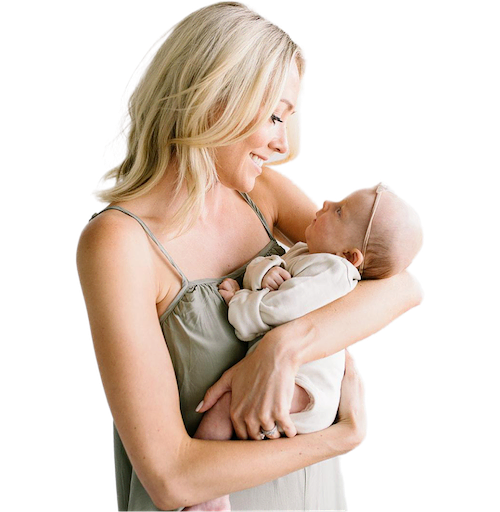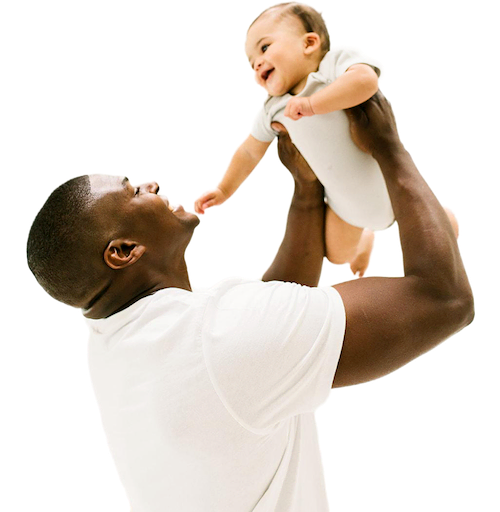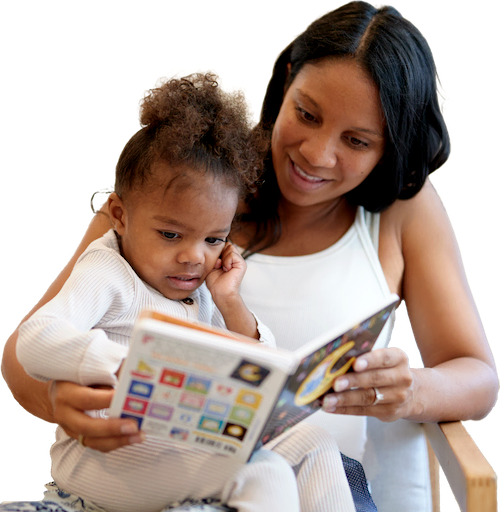Are you wondering how to play with your newborn? It sounds so simple, right? It can be! But, if you’re unsure of how to play with your newborn, that’s okay too. Let me help! Let's talk about play for newborns.
When should you start playing with a newborn? anchor
Play is how little ones learn. It's one of the most important ways your baby can build connections, practice motor skills, learn language, and so much more. You can start playing with your newborn the day you come home from the hospital. In the newborn phase, play is ANY interaction that your baby has with you and the world around them. You've probably been playing with your newborn without even realizing it.
How much play time do newborns need? How can I make sure I’m getting in enough play for my newborn?anchor
Play for newborns is often short and simple. Playtime doesn’t need to be elaborate or take up much time. In fact, it can’t take up much time! Newborns under 4 weeks can only handle wake windows of about 35-60 minutes before flashing sleepy cues, and even those 4-12 weeks are typically ready for another nap after 60-90 minutes. With wake windows so short, you may only have a few minutes for play by the time you’ve fit in feeding, diaper changes, and burping.
In my newborn class, I'll show you how to lay a healthy sleep foundation for your baby. I’ll give you the tools and resources you need to calm a fussy baby, have confidence as a parent, read your baby’s cues, and set your days and nights up for success (including having playtime!). And there's no crying involved!
How can I play with my newborn?anchor
Here are some of my favorite simple ways to play with a newborn:
Want more activities for your newborn? Try incorporating:anchor
Face to Face Time:anchor
Look into your baby’s eyes. Take advantage of those moments when your baby’s eyes are open and enjoy that eye contact! Babies recognize faces early on, and your face is the first one they will love. Each time your baby stares at you, they’re building an emotional bond.
Stick out your tongue and make funny faces. Studies show that babies as young as 2 days old can imitate simple facial movements -this is early development of their problem-solving skills!
Talking: anchor
Did you know that one of the ways that babies learn language best is through hearing more words? The more you talk, sing, and read to your baby, the more words that they hear and the easier it can become for your baby to develop language.
Talk about everything! You can narrate as you change their diaper, give them a bath, get their bottle ready, feed during a nursing session, and go about the day. This is a great way to add in some play while those wake windows seem so quick. Try to leave short pauses where your baby would speak. Before you know it, your baby will catch on to the conversation.
Reading can also be a great way to expose your baby to language. In the newborn phase, you can certainly read baby books, but you can also simply read aloud anything you’re reading at the time.
Singing: anchor
Music stimulates the brain and is an easy way to play with your newborn. To incorporate singing or music into your day with your newborn, you can simply play or sing whatever songs you love for your baby. You can also add lullabies into your snuggle sessions or bedtime routine. And if you want to include some baby body movement, you can try searching the internet for “favorite children’s songs,” “action songs for babies,” or check out this playlist. (Here are a few examples: “Wheels on the Bus,” “Itsy Bitsy Spider,” or “Head, Shoulders, Knees, and Toes”)
Tummy time: anchor
Tummy time is important for a baby’s development. One option is to use an activity mat, blanket, or another firm surface on the floor. You can also lay back and have your baby tummy to tummy with you! This strategy can be especially helpful for those tummy time haters.
A Note About Tummy Time: The American Academy of Pediatrics does recommend at least 15-30 minutes of tummy time per day (by 7 weeks of age). BUT know, this goal can be met by dividing it into shorter sessions throughout the day. If your newborn has 5 wake windows during the day and you can get even 3 minutes of tummy time during each wake window, your baby will get 15 minutes of tummy time that day.
Outside Play: anchor
Get outside with your newborn! You can do any of the activities above outside with your baby. Or you can put your baby in a stroller or carrier and go for a walk. Some fresh air and natural light can be so helpful for calming you and your baby, especially during the witching hour. And as a bonus: exposure to daylight during the day can also help your baby to sleep better at night.
What are the best toys for newborns?anchor
In the newborn phase, play truly can be simple. While newborns don’t “play” with toys in the traditional sense, there are toys that can be engaging and exciting to them. Here are ideas for the best newborn toys:
Expert Tip: Keep in mind that newborns can see only about 12 inches from their face and they haven’t yet developed the strength and mobility to reach for or pick up toys.
Simple Toys:anchor
Everything is brand new to a newborn, so simple toys actually work best. Newborns love things that are high contrast. That means that black and white images are really interesting to them. You can find cards, books, and so much more. Rattles or teethers can also be an exciting thing to show your baby as their vision develops.
Light and Music: anchor
Both light and music stimulate the brain for great awake time and brain growth. Often, swings are a great way to incorporate music and visual stimulation for awake times, especially during those tougher evening hours.
Mirrors: anchor
Babies love to look at themselves, and they love to look at babies. A mirror can be so captivating to your sweet baby during tummy time, while sitting on your lap, or while you are walking into the bathroom. Hold that mirror in front of them or prop it up and let them take a good look at their beautiful face.
Independent Play: anchor
Let your baby explore the world on their own too. Don't be afraid to give your baby some independent playtime. This is important as it enhances your baby's ability to observe and explore without constant stimulation from you. Play gyms are great newborn toys that can provide opportunities for independent play.
You:anchor
Do you know the best toy for a newborn? You! Truly. The interactions that your baby has with you and other loving adults (or siblings) is the best activity that they can have.
Bonus Tip: I put some of my favorite newborn toys along with some of the most recommended newborn toys from my team and the Taking Cara Babies community in my Amazon “0-4 Month Toy” section.
Need more inspiration for how to play with a newborn? anchor
Check out activities for a 1 month old, activities for a 2 month old, and activities for a 3 month old. Some parents also find a product like these activity cards to be helpful! They provide specific guidance on newborn play ideas vetted by specialists in pediatric physical therapy and speech pathology.
We are meeting your baby right where they are developmentally: providing awake time activities AND that important sleep. I believe in flexible routines, not rigid schedules, and my newborn class is here to help guide you if you need it! I want you to LOVE the newborn phase.
Want tips to help set your mind at ease about baby sleep before your little one arrives?
I have a free download called 5 Things Every Expectant Parent Needs to Know about Baby Sleep.
Keep in mind that the information and content on this blog is for informational purposes and should not be considered medical advice. If you have questions about your child, please reach out to your doctor.








